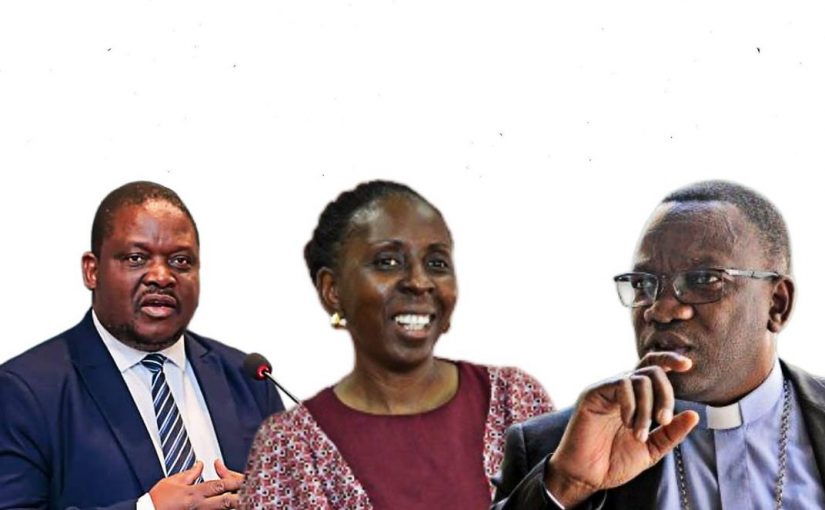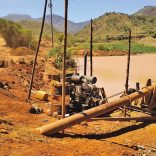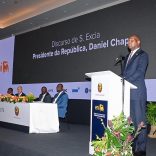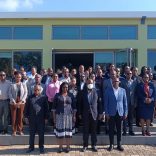Transcript : TotalEnergies SE, Q2 2025 Earnings Call, Jul 24, 2025
Mozambique: Emanuel Chaves, Benilde Nhalivilo and Dom Juliasse on the Sovereign Fund Supervisory Committee

Image: Carta de Moçambique
The names of the nine members of the Supervisory Committee of the Sovereign Fund of Mozambique – the public entity that will be responsible for managing the revenues from the exploration of natural gas in the Rovuma basin, in the province of Cabo Delgado – elected this afternoon by the Assembly of the Republic, are now known.
According to the results announced by the President of the Assembly of the Republic, the first Supervisory Committee of the Sovereign Fund will be composed by social activists Benilde Nhalivilo (former president of FORCOM); Estrela Charles (of CIP); businessman Inocêncio Paulino (former President of the SME Association); academics Emanuel Chaves (former CEO of the company Aeroportos de Moçambique) and Alcides Nobela (Director of Human Resources at Eduardo Mondlane University); lawyer Celestino Sitoe; the auditor Altino Mavile; and the religious leaders António Juliasse Sandramo (Bishop of Pemba) and Sheik Mussa Suefe.
The nine members of the Sovereign Fund Supervisory Committee were elected through a direct and secret ballot, involving 38 candidates selected by the Ad Hoc Committee created for this purpose, from the 76 citizens who submitted their applications for the scrutiny of the group led by Vitória Diogo.
The names elected yesterday by parliament coincide with the candidates proposed by the Ad Hoc Committee, except for Celestino Sitoe, former CEO of the Mozambican Mining Exploration Company, who occupied second place on the list of candidates put forward by the Mozambican Bar Association.
In its report, the Ad Hoc Committee states that it used a curriculum assessment of the selected candidates, based on the attribution of a score (from 0 to 20 points) “to distinguish the most qualified and prepared candidates to perform the functions required” by the body.
According to the Ad Hoc Committee Report consulted by ‘Carta’, a total of 76 citizens applied for the position of the Sovereign Fund body – 15 from civil society, five from the business sector, 26 from universities, seven from the Bar Association, seven from the Association of Accountants and Auditors and 16 from religious associations.
Of the 76 candidates, 38 were rejected due to insufficient requirements, with an emphasis on the candidacy of Carlos Jeque, former CEO of the company Linhas Aéreas de Moçambique, who applied to the Supervisory Committee via the Bar Association, at the level of the City of Maputo.
Of the accepted and evaluated candidacies, Benilde Nhalivilo and Estrela Charles occupied the top positions among the candidates from civil society organizations, with 18.3 and 17.3 points, respectively. Inocêncio Paulino obtained 18.8 points, being the only candidate accepted at the business class level.
Among the candidates proposed by higher education institutions, Emanuel Chaves had the highest score, with 19.4 points, followed by Alcides Nobela, with 17.9 points. Leonel Mulando was the best qualified among the candidates from the Bar Association, with 18.2 points, while Altino Mavile obtained 19.4 points among the accountants and auditors.
Dom António Juliasse Sandrano and Sheik Mussa Suefe were tied among the religious candidates, with 19.4 points each. It should be noted that Leonel Mulando was the only candidate rejected by parliament from among the top candidates in a group.
Paragraph 2 of article 14 of the Regulation of the Sovereign Fund establishes that this body is composed of two representatives of civil society; one representative of the business community; two representatives of academia; one representative of the Bar Association; one representative of the Accountants and Auditors Association; and two representatives of religious associations of recognized merit and national scope.
Tomás Vieira Mário and Angelo Macuácua among those “rejected”
Among the candidacies rejected after the curriculum evaluation, the highlights are the journalist Tomás Vieira Mário (by civil society), who obtained 16.6 points; the lawyer Filipe Sitoe (by academia), with 14.2 points; and the former CEO of the Road Fund ngelo Macuácua (by the Order of Accountants and Auditors), who obtained 16.6 points. The candidacy of the Auxiliary Bishop of Maputo, Osório Citora Afonso (by religious associations), who obtained 17.8 points, was also rejected.
The Ad Hoc Committee, led by Vitória Diogo and which had until June 30 to present its report, explained that it requested an extension of the mandate due to inconsistencies found in the screening of candidacies. “The screening consisted of a thorough and detailed verification of the compliance of the applications with the requirements established in the Public Announcement and the Terms of Reference,” it says, highlighting that the work began on 24 May and ended on 18 July, having lasted 56 days.
In the meantime, the assessment made by the Ad Hoc Committee on the candidates was questioned by the Parliament’s Commission on Constitutional Affairs, Human Rights and Legality of the Assembly of the Republic. In its opinion, the First Commission of Parliament stated that the competence of the Ad Hoc Committee was limited to verifying general requirements and selecting eligible candidates for member of the Sovereign Fund Supervisory Committee.
“Considering the special competence of the Assembly of the Republic to elect the members of the Sovereign Fund Supervisory Committee (…), the Commission understands that this can only be done in the plenary session, through an election process, from among several eligible candidates, selected by the Ad Hoc Committee,” argued the commission led by MP António Boene, suggesting an election in parliament with all of the 38 candidates. The vote lasted just over three hours.
The Supervisory Committee is an independent Sovereign Fund body mandated to control and monitor matters relating to the entity’s revenues; deposits in its transit account; the allocation of revenues to the state budget and the Fund; and supervise the management of the Fund.
The body reports all its activities to the Mozambican parliament, the Assembly of the Republic, in a quarterly report, and its conclusions are in the public domain.
The members of the Supervisory Committee will have a three-year term, renewable once, and the Chairman will be elected from among his peers. Their remuneration will be based on attendance fees for each session, under terms yet to be defined by the Ministry of Finance.












Leave a Reply
Be the First to Comment!
You must be logged in to post a comment.
You must be logged in to post a comment.